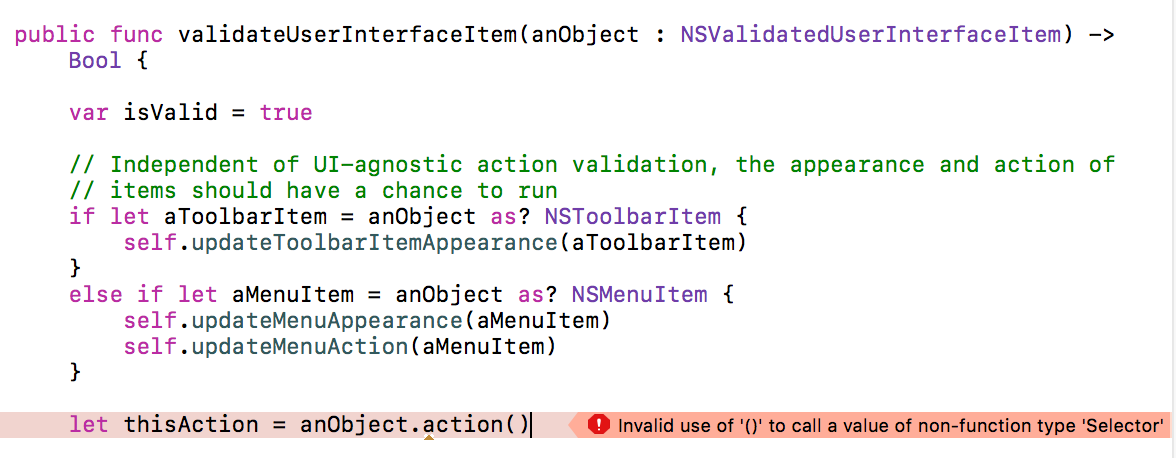I’m not quite ready to leap to Swift 3.0, so when the Xcode 8 beta asked me to migrate my existing Swift code, I opted to switch to Swift 2.3.
Swift 2.3 is notable for its utter dearth of new behaviors, compared to Swift 2.2.1. Since no code changes are required, you should be able to opt in to 2.3 on Xcode 8, while continuing to build and distribute with Swift 2.2.1 on Xcode 7.
On the other hand, you may run into some system SDK changes that force you to accommodate distinctions between, for example, the macOS 10.11 and 10.12 SDKs. Here’s an example of a build failure I ran into when I set to building my app on Xcode 8:

“invalid use of ‘()’ to call a value of non-function type ‘Selector'”
What does it mean? It means that in the 10.11 SDK, “action” is defined as a method:
@protocol NSValidatedUserInterfaceItem - (nullable SEL)action; - (NSInteger)tag; @end
While in the 10.12 SDK, it’s been upgraded to a property:
@protocol NSValidatedUserInterfaceItem @property (readonly, nullable) SEL action; @property (readonly) NSInteger tag; @end
Objective-C doesn’t care whether you access the value as a property, or by invoking the method that implements the property. Swift … does.
So, the fix in Xcode 8, with the 10.12 SDK, is to delete those parentheses so Swift appreciates that it’s accessing a property. But doing so will break the build back on the 10.11 SDK. What’s a forward-looking, backward-looking developer to do? You might think you could take advantage of Swift’s #available operator, and that in fact best expresses what we’re trying to do: to behave differently depending on the specific SDK that is being used:
if #available(OSX 10.12, *) {
thisAction = anObject.action
}
else {
thisAction = anObject.action()
}
But this still produces a build error, because Swift compiles both code paths of an #available block. Unfortunately, I think the only way to convince Swift to absolutely ignore the problematic line is to use a Swift compiler check, instead. Note that this is a bad solution because we are fundamentally not concerned about the version of Swift being used. If Swift 2.3 were made available in Xcode 7, against earlier SDKs, then the logic of our test would fail:
#if swift(>=2.3) thisAction = anObject.action #else thisAction = anObject.action() #endif
In my opinion, we need a compile time, conditional code exclusion that operates on the SDK, similarly to #available. Something like “#if sdk(OSX 10.12)”. As far as I know, nothing like this exists.
I’ll report a bug to Apple requesting such functionality, but I wonder if I’m overlooking something obvious that already fits the bill. Any ideas?
Update: Radar #26895983.